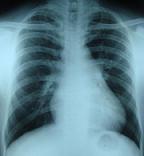Advertisment
Bronchiectasis mortality risk in COPD

Bronchiectasis is independently associated with an increased mortality risk in patients with moderate-to-severe COPD, according to a new study from researchers in Spain.
Bronchiectasis, a permanent and progressive dilation of the lung’s airways, is common in COPD patients and is associated with longer and more intense exacerbations, more frequent bacterial colonization of the bronchial mucosa, and a greater degree of functional impairment.
“As COPD patients with bronchiectasis have an increased incidence of other known prognostic factors, we hypothesized that bronchiectasis itself would also have prognostic value,” said lead author Miguel Ángel Martínez-García, MD, of La Fe University and Polytechnic Hospital in Valencia, Spain. “We found that the presence and severity of bronchiectasis were associated with an increase in all-cause mortality in patients with moderate-to-severe COPD, independent of other known risk factors, including pulmonary function and other comorbidities.”
The multicenter prospective observational study included 201 consecutive patients with moderate-to-severe COPD; 115 of them (57.2%) had bronchiectasis, which was diagnosed by high-resolution computed tomography (CT) scan of the chest. COPD severity was classified according to Global Initiative for Chronic Obstructive Lung Disease (GOLD) criteria.
During a median 48 months of follow-up, there were 51 deaths, including 43 among the patients with bronchiectasis. In a multivariate analysis adjusted for dyspnea, body mass index, presence of potentially pathogenic microorganisms in sputum,comorbidities, number of severe exacerbations and other potentially confounding factors, bronchiectasis was associated with a significantly increased risk of all-cause mortality (hazard ratio 2.54, 95%CI, 1.16-5.56; p=0.02).Age, Charlson Index, and post-bronchodilator ratio of forced expiratory volume in 1 second were also shown to have prognostic value.
The study had a few limitations, including that some variables that have been shown to predict mortality in COPD were not included in the analysis and exact measurement of the size of the bacterial load in sputum samples was not possible.
“If the prognostic value of bronchiectasis in patients with moderate-to-severe COPD that we found is confirmed in further and larger studies, it would have an important clinical impact,” said Dr. Martínez-García, “Bronchiectasis can be reliably diagnosed with high-resolution CT scanning, and effective treatments are available, potentially reducing the risk of mortality in patients with COPD.”
The findings were published online ahead of print publication in the American Thoracic Society’s American Journal of Respiratory and Critical Care Medicine.





